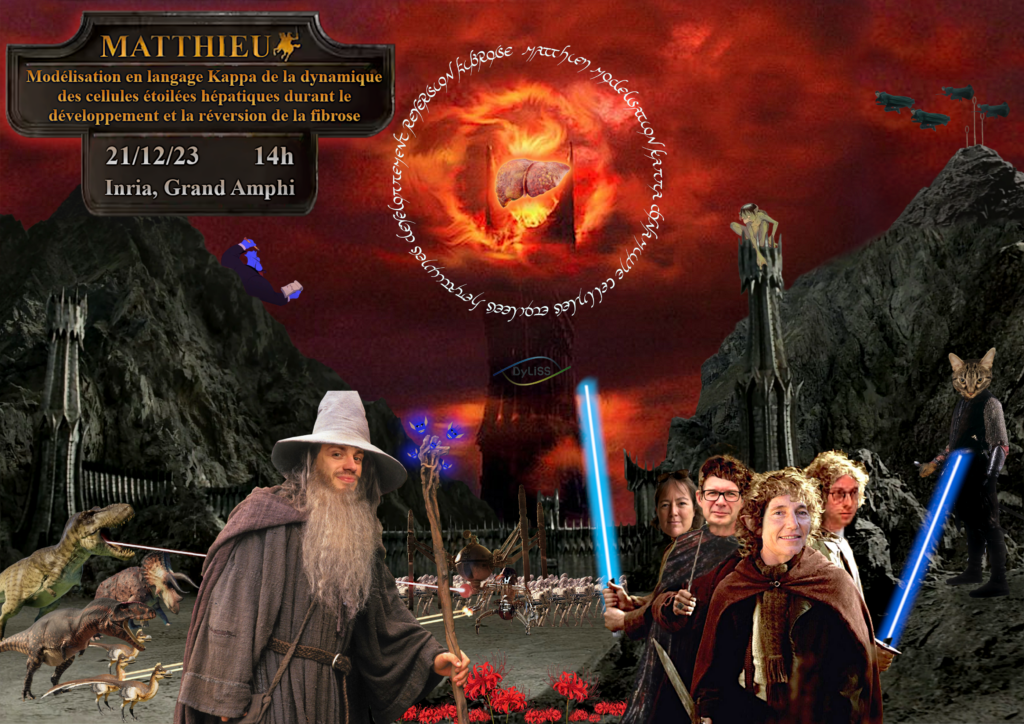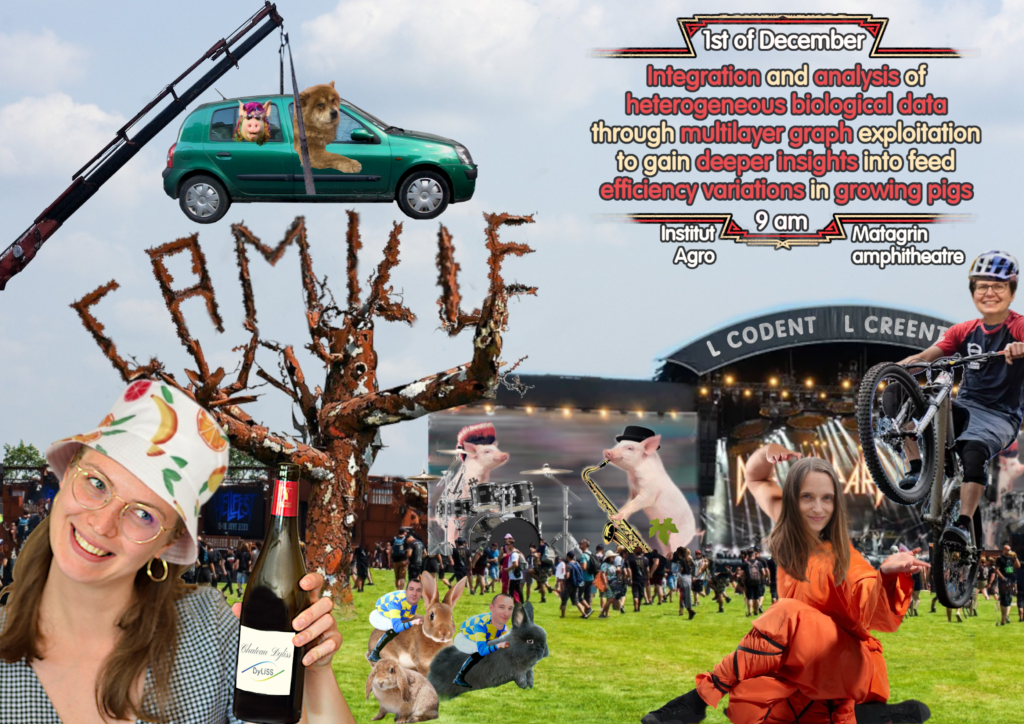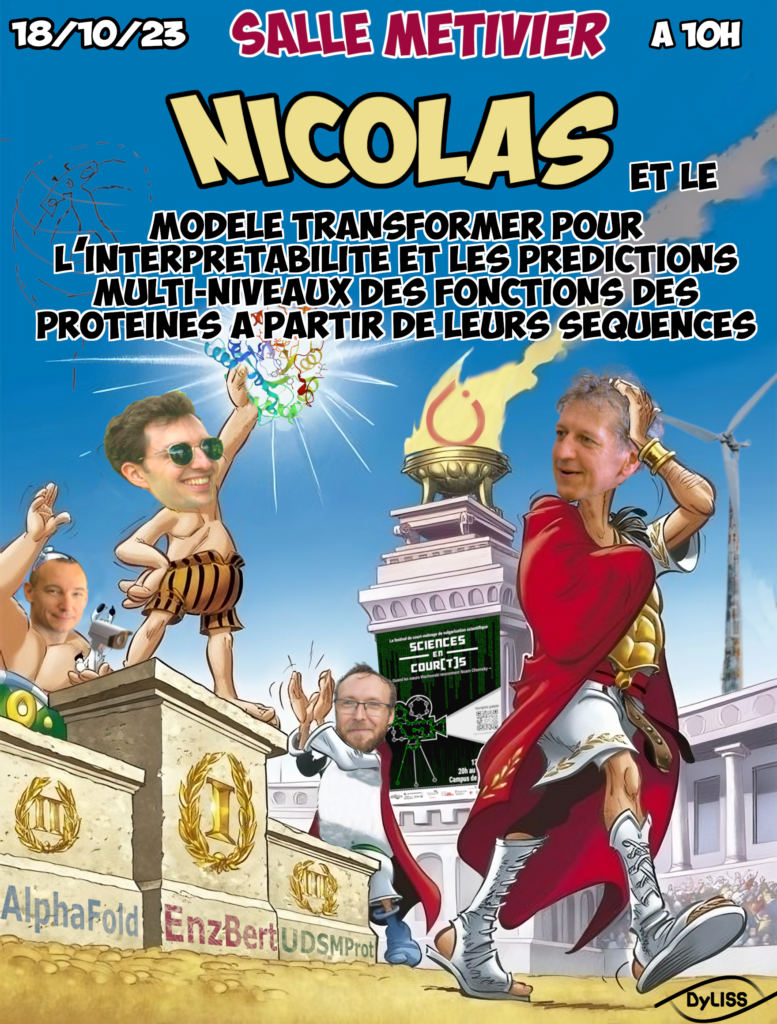Camille Juigné won the Open Science PhD award for her work on “Integration and analysis of heterogeneous biological data through multilayer graph exploitation to gain deeper insights into feed efficiency variations in growing pigs”, co-supervized by Florence Gondret (INRAe PEGASE) and Emmanuelle Becker (DYLISS)
Matthieu Bouguéon’s PhD defense: 21st December 2023 14:00
Matthieu Bouguéon will defend his PhD thesis “Kappa language modelling of hepatic star cell dynamics during fibrosis development and reversion” on Thursday 21st December 2023 at 14:00, room Métivier at IRISA.
Thesis committee:
– Anna NIARAKIS, Professor – Université de Toulouse (reviewer)
– Cédric LHOUSSAINE, Professor – Université de Lille (reviewer)
– Fabien CRAUSTE, Research director CNRS – UMR 8541 CNRS, Univ Paris Cité (reviewer)
– Sophie LOTERSZTAJN, Research director Inserm – UMR 1149 Inserm, Univ Paris Cité
– Nathalie THÉRET, Research director Inserm – UMR1085 Inserm, EHESP, Univ Rennes (thesis director)
– Anne SIEGEL, Research director CNRS – UMR 6074 CNRS, Inria, Univ Rennes (thesis director)
– Jérôme FERET, Researcher Inria – ENS, Paris (thesis supervizor)
Abstract:
Hepatic fibrosis is an excessive scarring response induced by chronic injury. It is characterised by an accumulation of extracellular matrix (ECM), mainly composed of collagen 1 (COL1), which increases tissue rigidity and leads to severe liver dysfunction. Activation of hepatic stellate cells (HSCs), induced by growth factor TGFB1, is the main process underlying liver fibrosis.
In order to study the dynamics of HSC during the development and reversion of fibrosis, we have developed a multi-scale model integrating the different states of HSC as well as their production of COL1, under the influence of TGFB1. This model is implemented using the Kappa language, which is a rewriting language for site graphs. As well as being the first multi-scale Kappa model, this model allowed us to capture the plasticity of star cells during the development and reversion of fibrosis. The model’s predictions show that the inactivation state of HSC plays an essential role in the development of fibrosis. The model was validated by new experiments in mice and the predictions were validated with RNAseq data from fibrotic patients.

Camille Juigné’s PhD defense: 01st December 2023 09:00
Camille Juigné will defend her PhD thesis “Integration and analysis of heterogeneous biological data through multilayer graph exploitation to gain deeper insights into feed efficiency variations in growing pigs” on Friday 01st December 2023 at 09:00, amphi Matagrain, Agrocampus.
Thesis committee :
– Mathieu Emily, professeur à l’Institut Agro Rennes Angers (examinateur, président du jury)
– Michel Dumontier, professeur à l’Université de Maastricht (examinateur)
– Andrea Rau, directrice de recherche à l’INRAE (rapportrice)
– Fabien Jourdan, directeur de recherche à l’INRAE(rapporteur)
– Florence Gondret, directrice de recherche à l’INRAE (directrice de thèse)
– Emmanuelle Becker, maîtresse de conférence à l’Université de Rennes (co-encadrante de thèse)
Résumé :
Les progrès technologiques d’étude du vivant ont conduit à une explosion de données multimodales et multicentriques. Ce phénomène soulève de nombreuses questions liées au stockage, à la standardisation et à l’analyse de ces données massives. Ainsi, ce travail de thèse porte sur le développement d’une méthode intégrative d’analyse de données biologiques, pour en extraire de la connaissance. Pour prendre en compte leur forte interdépendance, cette approche consiste à intégrer différents types d’entités biologiques (ARNm, protéines, métabolites, caractères observables) qui sont habituellement étudiés indépendamment les uns des autres. La solution informatique élaborée permet d’intégrer ces données hétérogènes dans un graphe multicouche, avec une couche par type d’entités. L’originalité est de relier les éléments d’une couche ou de couches différentes par des propriétés extraites des bases de données et de connaissances publiques à l’aide de technologies du Web Sémantique. A partir de ce graphe, le but est de caractériser les relations entre un groupe de molécules d’intérêt grâce à des métriques de la théorie des graphes. La méthode développée a été appliquée à des jeux de données expérimentaux (transcriptomique, métabolomique et phénotypes animaux) pour décrire et comprendre les relations entre les molécules et leur importance dans la variation d’efficience alimentaire de porcs. L’efficience alimentaire est un phénotype clé pour contribuer à un élevage durable, mais complexe. Ce travail a permis de mettre à disposition des méthodes d’analyse novatrices, à différentes échelles de l’organisation du vivant, favorisant une meilleure compréhension des processus biologiques.
Mots clés : Efficience alimentaire, Graphe multicouche, Intégration de données, Multi-omiques, Web sémantique

Nicolas Buton’s PhD defense: 18th October 2023 10:00
Nicolas Buton‘s defense of his PhD thesis “Transformer models for interpretable and multilevel prediction of protein functions from sequences” on Wednesday 18th October 2023 at 10:00, room Métivier at IRISA.
Thesis Committee
- Nataliya SOKOLOVSKA (President and Rapporteur), Professeure des universités, laboratoire LCQB, Paris, France
- Tatiana GALOCHKINA (Rapporteur), Maîtresse de conférences, Université Paris Cité, labroratoire BIGR, France
- Blaise HANCZAR (Rapporteur), Professeur des universités, Université Paris-Saclay/Evry, laboratoire IBISC, France
- Yann Le Cunff (Encadrant), Maître de conférences, Université de Rennes, France
- François COSTE (Encadrant), Chargé de recherche Inria, Rennes, France
- Olivier Dameron (Directeur), Professeur des universités, Université de Rennes, France

Olivier Dennler’s PhD defense: 19th December 2022 14:00
Olivier Dennler’s defense on “Characterization in functional modules of ADAMTS-TSL proteins, by phylogeny approaches” will take place on Monday 19th December 2022 at 14:00, room Métivier at IRISA.
Committee:
-
Lydie LANE : Co-directrice du groupe CALIPHO, Université de Genève, SIB
-
Hugues RICHARD : Directeur de recherche Robert Koch Institute, Berlin
-
Vincent BERRY : Professeur Université Montpellier, LIRMM
-
Pierre TUFFERY : Directeur de recherche INSERM, Paris
-
Nathalie THÉRET : Directrice de recherche INSERM, Rennes
-
François COSTE : Chargé de recherche Inria, Rennes
-
Samuel BLANQUART & Chargé de recherche Inria, Rennes
-
Catherine BELLEANNÉE & Maîtresse de conférence Université de Rennes 1
Abstract:
The human ADAMTS-TSL multidomain proteins are involved in numerous pathologies.
Encoded by 26 paralogous genes, their domain combination is not sufficient to characterize their functional differences.
We propose in this thesis a new approach to identify functional regions of the sequences.
For this purpose, we use sequences from 9 eukaryotic species to identify conserved sequence modules specific to certain subgroups of homologous sequences.
The evolutionary analysis of the identified modules is obtained by performing a joint phylogenetic reconstruction of genes, species and modules.
Furthermore, to validate the functional interest of the identified modules, we associate phenotypes (PPI) to this evolutionary history.
This has led to the identification of concomitant acquisitions of “modules/phenotypes”, predicting the functionality of these modules.
Applying this approach to human ADAMTS-TSL proteins has allowed us to identify new, finer, non-contiguous functional regions that can describe their specificities.
Emmanuelle Becker’s HDR defense: 14th December 2022
Emmanuelle Becker’s HDR defense on “From homogeneous data to heterogeneous data in systems biology” will take place on Wednesday 14th December 2022 at 14:00, room Petri-Turing at IRISA.
Committee:
- Anaïs BAUDOT : Directrice de recherche (MMG, Marseille), rapportrice
- Christine BRUN : Directrice de recherche (TAGC, Marseille), examinatrice
- Alessandra CARBONE : Prof. Sorbonne Univ. (LCQB, Paris), examinatrice
- Olivier DAMERON : Prof. Univ. Rennes (IRISA, Rennes), examinateur
- Elisa FROMONT : Prof. Univ. Rennes (IRISA, Rennes), examinatrice
- Alejandro MAASS : Prof. Univ. Chile (CMM, Chili), rapporteur
- Anne SIEGEL : Directrice de recherche (IRISA, Rennes), examinatrice
- Patricia THEBAULT : MCU Univ. Bordeaux (LABRI, Talence), rapportrice
Abstract:
Biological systems involve a large number of different entities, each functionning in a coordinated manner with the others.Their understanding is crucial and can be approached at different scales, from the molecular to the systemic one.
The observation of all these entities in different contexts and at different scales generates a “tsunami of data”, posing complex and interesting computational problems.
My work focuses on the development of methods for knowledge generation and knowledge extraction from these massive data.
The manuscript is organized in three axes. The first axis deals with methods to identify interpretable, robust and replicable signatures in high dimensional unimodal data. The second axis proposes the development of a new approach to integrate multimodal data (miRNA + MRI), and to identify disease progression scores. Finally, the third axis also deals with the integration of heterogeneous data, but with a systemic approach, i.e. taking into account the known relationships between entities. The work presented illustrates the complexity of extracting information from existing databases, despite the constant efforts of the bioinformatics community to structure and unify the available information.
Arnaud Belcour’s PhD defense: 21st october 2022 14:00
Arnaud Belcour’s PhD defense on “Combining knowledge-based and sequence comparison approaches to elucidate metabolic functions, from pathways to communities” will take place on Friday 21st october 2022 at 14:00, room Métivier at IRISA.
Committee:
- Delphine Ropers, senior researcher, Inria Grenoble
- David Vallenet, senior researcher, CEA Genoscope Évry-Courcouronnes
- Karoline Faust, associate professor, KU Leuven
- Fabien Jourdan, senior researcher, INRAe Toulouse
- Cédric Lhoussaine, professor, Univ. Lille
- Samuel Blanquart, researcher, Inria IRISA Rennes
- Olivier Dameron, professor, Univ. Rennes1, IRISA Rennes
- Anne Siegel, senior researcher, CNRS IRISA Rennes
Abstract:
Metabolism can be modelled and studied at many levels. The first level is the metabolic pathways, which contain a set of chemical transformations leading to the production of compounds of interest. Alternative metabolic pathways were predicted in an alga using a formalism of the metabolic pathway drift and its implementation with constraint programming. The second level is the organism metabolism which contains hundreds of metabolic pathways. A method has been developed to reconstruct homogeneous metabolic networks from heterogeneous public data. The third level is the metabolism of a group of organisms (or taxon) which can be useful to characterize an organism that has not been clearly identified. To achieve this, a method using knowledge engineering and sequence comparison has been created. Finally, the fourth level is the metabolism of a community and the metabolic interaction in this community. A method has been developed to identify the key species among a community.
Short scientific film festival: “patatogene” won 3 awards!
During the short scientific film festival Sciences en court[t]s, Kerian Thuillier (Dyliss), Roland Faure (GenScale), Khodor Hannoush (GenScale), Sandra Romain (GenScale) and Baptiste Ruiz (Dyliss) won 3 prizes (public, scenario and outreach) for their movie “patatogene” (soon on youtube).
Virgilio Kmetzsch PhD defense: 26th september 2022
Virgilio Kmetzsch’s PhD defense on “Multimodal analysis of neuroimaging and transcriptomic data in genetic frontotemporal dementia” will take place on September 26th at 2:30 PM, at the Paris Brain Institute (ICM) room 1-2.
Virgilio is co-supervized by Olivier Colliot (ARAMIS team) and Emmanuelle Becker (DYLISS) in the IPL neuromarker project.
Nicolas Guillaudeux’s PhD defense: 16th december 2021 14:00 (UTC+1)
Nicolas Guillaudeux’s PhD defense on “Comparing genes’ structures for predicting coding alternative transcripts in human, mouse and dog” will take place on 16th december 2021 14:00 (UTC+1).
The defense will be broadcasted live on youtube https://youtu.be/7HuFFPMFM9U
Committee:
- BERARD Sèverine, Maîtresse de conférences, Université de Montpellier (rapportrice)
- LAINE Elodie, Maîtresse de conférences, Sorbonne Université (rapportrice)
- DIOT Christian, Directeur de recherche INRAE, Rennes (examinateur)
- LARTILLOT Nicolas, Directeur de recherche CNRS, Lyon (examinateur)
- VARRE Jean-Stéphane, Professeur, Université de Lille (examinateur)
- BELLEANNEE Catherine, Maîtresse de conférences, Université de Rennes 1 (encadrante)
- BLANQUART Samuel, Chargé de recherche Inria, Rennes (encadrant)
- DAMERON Olivier, Professeur, Université de Rennes 1 (directeur de thèse)
Keywords: Bioinformatics, comparative genomics, alternative splicing, alternative transcription, orthology, transcript prediction
Abstract:
Living organisms are capable of expressing several alternative transcripts (or RNAs) from a single gene. These transcripts are responsible for the regulatory mechanisms of the organism, some of them are translated into protein. Today, detecting the set of transcripts that can be expressed by a gene is an open problem which many computational methods such as RNA sequencing, spliced sequence alignment methods or comparative genomics methods try to address. This thesis proposes a comparative genomics method to compare the sequence of genes shared by several species. The result is a method for predicting transcripts on a multi-species scale, based on a graph structure. This method was applied to three species (human, mouse, and dog). It allowed to predict a relevant number of transcripts as well as to identify a set of genes that are conserved between the three species and that share both the same exonic structures and the same CDS.


